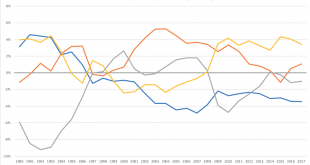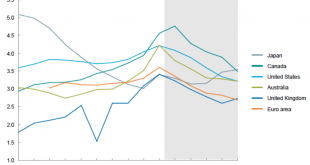I’ve recently written a ‘top 10’ review of a new book on supportive housing—i.e., subsidized housing with social work support—for persons with serious mental health challenges. The book’s an anthology that was edited by three Ontario-based researchers. A key questions that emerges in the book is: Should such housing be owned and operated by for-profit providers, or by non-profit providers? An advantage of non-profit ownership, in my opinion, is that a non-profit entity eventually owns the...
Read More »To Secure a Future, Britain Needs a Green New Deal
This is an extract from a chapter in Economics For the Many (Verso, 2018) edited by Rt. Hon. John McDonnell MP. The chapter was written in August, 2017. If we are to secure a sustainable, stable and liveable future for the people of Britain, then implementation of the Green New Deal will be vital. Not just for the sake of the ecosystem, but also for the sake of rebuilding a stable, sustainable economy. The era of procrastination, of half measures, of soothing and baffling...
Read More »Brian Romanchuk
In previous articles (example), I have been arguing that investment is the major driver of the private sector cycles. (I am using the national accounting definition of investment, and not the act of purchasing financial securities.) We can now turn to the data, and the important question: how are we doing right now?… There are a number of categories of expenditures that are all lumped under the notion of investment. The major categories of interest are: Investment by government (which is...
Read More »An Analysis of Financial Flows in the Canadian Economy
An essential but perhaps overlooked way of looking at the economy is a sector financial balance approach. Pioneered by the late UK economist Wynne Godley, this approach starts with National Accounts data (called Financial Flow Accounts) for four broad sectors of the economy: households, corporations, government and non-residents. Here’s how it works: in any given quarter or year each sector can be a net borrower or lender, but the sum of the four sectors’ borrowing/lending must equal to...
Read More »The Massive Need for Infrastructure in the Emerging and Developed World
This is the first in a series of blog posts on financing infrastructure assets Insufficient or inadequate infrastructure in both developing and developed economies has sparked a debate about whether financing is sufficient to sustain infrastructure investment to at least keep pace with projected global GDP growth. The task of keeping the minimum investment required to maintain current levels and fostering incremental spending to close the infrastructure gap has revived the debate over...
Read More »Dirk Ehnts — A short comment on Temin and Vines on Keynes
… For those that want to understand how Keynes is relevant for the 21st century I would recommend reading the original books – now in public domain – or modern books from Post-Keynesian/Modern Monetary Theory authors. econoblog 101A short comment on Temin and Vines on KeynesDirk Ehnts | Lecturer at Bard College Berlin
Read More »Nick Rowe — “Profits = Investment – Saving”
"Profits = Investment - Saving"Or, "Profits = Expenditure - Income". Those are just alternative ways of saying the same thing, for a closed economy, if investment and saving include government investment and saving. Most economists will say that's wrong. And it is wrong by standard definitions, where aggregate expenditure and income are the same thing, and investment and saving are also the same thing (for a closed economy, including government investment and saving). But let me tell you...
Read More »Brad DeLong — John Maynard Keynes: Essays In Biography
Brad rates this as a should-read. For anyone interested in Keynesianism, Post Keynesianism and MMT, the history of economics, or economic theory, it is a must-read. Conventional economists have apparently concluded that they don't need to read it if they even thought about, which most probably haven't, being under the spell of the "normal paradigm" in spite of its poor results empirically.Washington Center for Equitable GrowthJohn Maynard Keynes: Essays In Biography Brad DeLong Here...
Read More »Productivity and Employment: A Cautionary Tale
Ah, productivity. Who knew that our whole prosperity was totally dependent on a concept as nebulous as this?To be sure, it doesn't sound nebulous. It is output per worker per hour. What is so difficult about that?The problem is how you define "output". Usually, we take this to mean GDP (gross domestic product), though we might use GNP (gross national product) or GVA (gross value added). In this post, I shall use GDP.As Diane Coyle has engagingly written, GDP is a deeply flawed measure....
Read More »IPPR’s UK Industrial Strategy: focus on demand, not just supply
Within hours of becoming Prime Minister last year, Theresa May made an important economic statement. She put ‘Industrial Strategy’ in the title of the Department for Business. No longer, she was declaring, would a Conservative administration regard active government intervention in the economy as anathema. The economy was too weak for such a luxury. Henceforth the state would play a leading role in getting markets and private enterprise to work better. In most developed...
Read More » Heterodox
Heterodox



